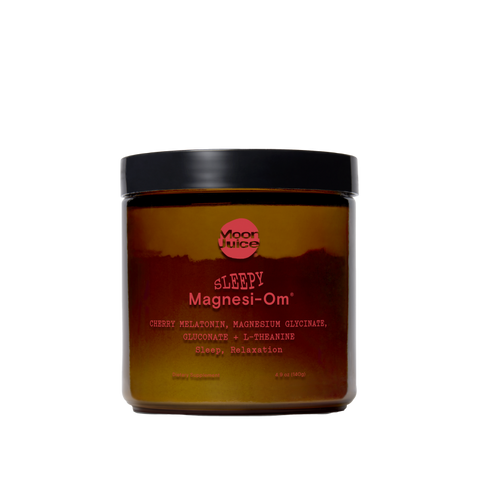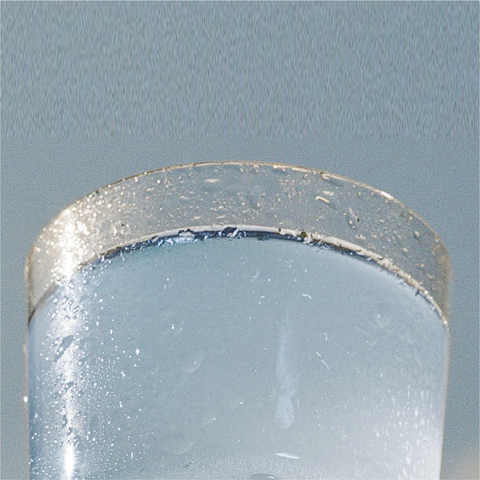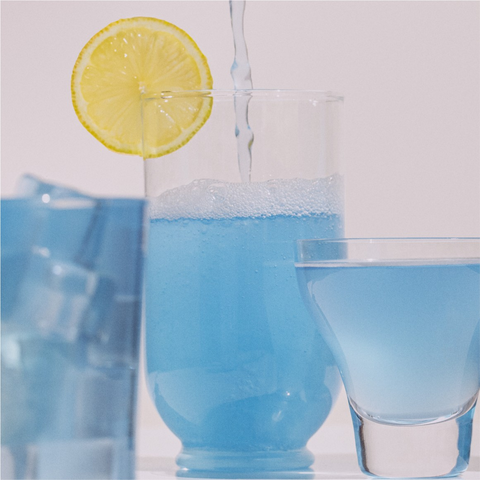Melatonin, a hormone produced in the pineal gland, plays a major role in regulating your sleep-wake cycle. But you can also consume it in various supplements when you need some extra help falling asleep and achieving restful sleep. With so many types of Melatonin and natural sleep supplements out there, how do you know which one’s best for your personal sleep routine?
If you’re debating Melatonin gummies vs. pills or powders for better sleep, here’s everything to consider before adding to your cart.
Forms of Melatonin
Darkness naturally triggers your brain to release Melatonin, signaling that it’s time for your body to sleep. But during travel, shift work, postpartum, stress, and other life events, we can look to help in the form of a Melatonin supplement. Melatonin is available in various dietary supplement forms, including sleep gummies, pills, and powders, each with its own set of considerations and benefits.
Gummies
Melatonin gummies are a popular choice for people who prefer a tasty chew. They’re easy to take, without the need for water. However, sleep gummies usually contain added sugars and animal byproducts, which you may not want in a dietary supplement, so it’s always good to check the label.
Pros:
- Melatonin gummies are easy to chew and swallow, making them useful for people who have trouble swallowing pills.
- They’re a sweet treat that can be more rewarding to take than a pill.
- You don’t need any water to consume gummy vitamins, so if you’re trying to avoid drinking water before bed, this can be helpful.
Cons:
- A lot of gummies are made using gelatin from animal parts, making them unsuitable for vegans and other people who avoid this ingredient.
- Gummies tend to be filled with sugar and unhealthy ingredients.
- They also tend to stick to your teeth.
- If you’re trying to take a microdose, it can be hard to divide a gummy into the precise amount that you want to take.
- Because they taste like candy, it can be easy to overindulge in gummy vitamins.
- Gummies can clump together in the heat or become hard, gooey or dark over time or with changes in temperature.
Pills
Melatonin pills are another common form, available in both immediate-release and extended-release formulas. They’re convenient and easy for most people to use unless you have difficulty swallowing.
Pros:
- Pills are less likely to have added calories, gelatin, or sugary flavorings that could spike your blood sugar levels at bedtime.
- You can take a pill after brushing your teeth.
- Pills tend to be more shelf stable, so they won’t end up gooey or hard like gummies.
Cons:
- Pills can be difficult for some people to swallow.
- Pills may or may not be free of animal products.
- If you’re trying to take a microdose, it can be hard to divide a pill into the amount you need. For instance, if your pills contain 5mg and you want a 1mg dose, it can be difficult to divide a pill into 5 parts.
- Pills take longer to be absorbed in the body, so you might not feel the effects as quickly.
Powder
Melatonin powder offers a fully customizable option for improving your sleep cycle, since you can mix it yourself into your liquid. This allows for more precise dosing, and they can come in flavored or unflavored options.
Pros:
- You don’t need to break or divide anything—you can measure out the exact dose you want and take as little as you need without half a gummy or pill floating around in your jar.
- You can find powders that are either flavored and sweetened or completely unflavored, depending on your preferences.
- Powders can be mixed into what you’re already drinking or make any drink into a functional, sleepy girl mocktail, from water to tea to juice and sparkling water.
- Powders are easy to swallow and consume.
- Powders don’t need to be made with gelatin from animal parts.
- A powder format won’t clump, get gooey, or darken in the bottle, as it’s more shelf-stable than the Melatonin gummy form.
Cons:
- Powdered Melatonin is usually mixed with water, so you’ll need access to water when you’re reading to start winding down.
- Some Melatonin powders can come with sugar and unwanted filler ingredients, so be sure you’re using a trusted source.
Remember that Melatonin is a hormone, so it’s always a good idea to talk to your doctor about how it fits with your health history and lifestyle before welcoming this sleep supplement into your regular routine.
Choosing the Right Form for You
Now that you’ve reviewed all the pros and cons of each form of Melatonin, you can properly assess which kind is the best fit for you personally. Here’s what it comes down to.
Efficacy
There’s some evidence that certain gummy vitamins, such as Vitamin D, may be more readily absorbed by your body than tablets,1 perhaps since it starts to dissolve with your saliva as you’re chewing, but any form should be effective at delivering Melatonin to your system.
No matter the form of Melatonin that you take, it’s important not to take too much. So, how much melatonin should you take? Studies show microdoses of .3 mg to .5 mg of Melatonin are actually more effective than large doses at reducing the time it takes you to sleep and improving sleep quality without inducing grogginess or the dreaded Melatonin hangover.2,3,4,5,
High doses of Melatonin also oversaturate your brain receptors, which can actually desensitize them, making your body less receptive to both the Melatonin you create and the supplements that you take.
Convenience
According to a 2019 epidemiology study, 1 in 6 adults has trouble swallowing pills.6 If you’re one of those people, you might consider taking gummy supplements or powder form instead. Gummy supplements and pills allow for convenience without the need for water, but Melatonin powder allows you to take exactly how much you want and mix it in your bedtime beverage of choice.
Magnesium & Melatonin Powder for Better Sleep
Overall, because they don’t require swallowing to consume or animal parts to manufacture, Melatonin powders are a clear winner if you’re looking for an easily divided and great tasting (or flavorless) option to suit your sleep routine. But not all Melatonin powders are created equal.
Ingredients are important if you don’t want to spike your blood sugar right before bed or get too groggy the next day from Melatonin. Higher dose Melatonin supplements put you outside the natural range that your body needs to regulate your circadian rhythm. This can flood your brain receptors and create up to 100 times the natural amount of Melatonin in your blood, resulting in unwanted side effects commonly reported after Melatonin use.
Made with plant-based Phytomelatonin, Sleepy Magnesi-Om® contains a microdose of .3mg to keep you in the natural range without the grogginess. With non-laxative Magnesium to help you unwind and L-Theanine to support sleep quality, this natural Magnesium powder for sleep helps support all your sleepy needs. It dissolves instantly in water and is made with zero sugar.
Takeaways
It all comes down to what works best for you and your lifestyle—but whichever Melatonin supplement you choose, be sure to use a trusted provider. If it’s not called Phytomelatonin, it’s either synthetic and made using toxic solvents—or animal-based, coming from the pineal glands of cows and sheep. The dosage is also important since most Melatonin products include way more than your body needs. A microdose of Phytomelatonin can help your circadian rhythm adjust, decreasing the time it takes for you to fall asleep without giving you a Melatonin hangover.

Sources
- National Library of Medicine, Bioequivalence Studies of Vitamin D Gummies and Tablets in Healthy Adults: Results of a Cross-Over Study. https://www.ncbi.nlm.nih.gov/pmc/articles/PMC6566230/
- The Journal of Clinical Endocrinology & Metabolism, Melatonin Treatment for Age-Related Insomnia. https://academic.oup.com/jcem/article/86/10/4727/2849013?login=false
- National Library of Medicine, Effects of exogenous melatonin on sleep: a meta-analysis. https://pubmed.ncbi.nlm.nih.gov/15649737/
- National Library of Medicine, Optimal dosages for melatonin supplementation therapy in older adults: a systematic review of current literature. https://pubmed.ncbi.nlm.nih.gov/24802882/
- MIT News, Rest easy: MIT study confirms melatonin's value as sleep aid. https://news.mit.edu/2005/melatonin
- National Library of Medicine, Prevalence and Characteristics of Dysphagia Based on a Population-Based Survey. https://www.ncbi.nlm.nih.gov/pmc/articles/PMC7180111/














